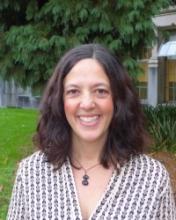The last time Ann Frost, a lecturer in the Sociology Department and Law, Societies, and Justice, taught a course that focused on juvenile justice she and twelve UW undergraduate students traveled to the Monroe Correctional Complex as part of a mixed-enrollment class with men who were incarcerated. Three years later, she’s teaching in a completely different context: now it’s a large lecture course to Sociology majors, offered remotely because of the pandemic, and taking place during a period when the brutal inequalities of American policing are on the minds of many students. In spite of these challenges, Frost believes the digital environment of COVID instruction has enabled her to teach the Sociology of Juvenile Justice in a way that meets the moment by deepening her relationships with students and reshaping their collective sense of social change.
Dr. Frost says that teaching remotely has relaxed the constraints of time and space. This new fluidity has transformed her online discussions, where Frost says the traditional hierarchy of the classroom has flipped: now on Zoom and on class discussion boards, students generate the questions and topics of conversation and Dr. Frost responds by scaffolding and moderating their discussions. In spite of her early apprehensions about remote teaching and learning, Frost has found that the online context has facilitated more interaction between students and deeper conversations about challenging material. Students who previously would have caught Ann after class now use email more substantively, frequently sharing relevant news articles or writing messages about connections they’re making with the course content. It is difficult to pinpoint exactly why these changes have occurred. Is it because Zoom boxes equalize the size of students and teachers on the screen? Or because changing the teaching environment shakes things up enough to alter traditional patterns of classroom communication? Regardless of the reason behind the changes, Frost is already thinking about how to continue this style of engagement when she returns to in-person instruction because she sees the great benefits this active involvement has for student learning.
Frost has also noticed a subtle and important shift in accountability, what she describes as socially aware students “holding her to a high standard” or checking in with her about how difficult topics are discussed. More students are paying close attention to the news, and they are actively connecting what they have learned about structures of inequality in previous sociology courses to current events and their own lives. And many have become more engaged in conversations about social justice. As a result, students reached out to clarify dates in a video about Ahmaud Arbery and have pushed back on, what seems to them, an unnecessarily abstract way of talking about systemic racial violence. “I have had a student or two who will say, ‘Sometimes it bothers me when you talk about this issue from a systemic perspective. I do appreciate that you bring it back to the impact of people and inequality.’” Dr. Frost characterizes these interactions as challenging, respectful, and helpful. Her response is often, “Thanks, I want to hear that feedback. And also, I’m teaching, in part, about that systemic perspective because that’s what is happening. If we are thinking about reform or sociological factors and implications we have, to some extent, to understand how multiple aspects of society reinforce each other.” Ann notes that for these students it is important to both learn about these topics and to discuss them “in a way that is inclusive and doesn’t perpetuate inequities” -- in a class focusing on juvenile justice the systemic is often personal, too.
Looking forward, Frost hopes students appreciate how the past year and a half has revealed their resilience and capacity for change. She tries to encourage them by “letting them understand what they can do… Let’s focus on what we can control. We have learned so much and we know so much about what’s important to us in this last year and how we can manifest what we want to do based on what’s important to us. Let’s focus on that.”
Like many of us, the students in SOC 375 have experienced unprecedented, real-time change in their learning environments and in the urgency of racial justice. But because these students have grappled with how the criminal legal system labels, processes, and punishes young people, they are able to engage with critiques of the criminal legal system with more nuance. The last year has taught us all that social change is sometimes quick, and Dr. Frost’s students also understand that they can have a role to play in shaping their future world.
